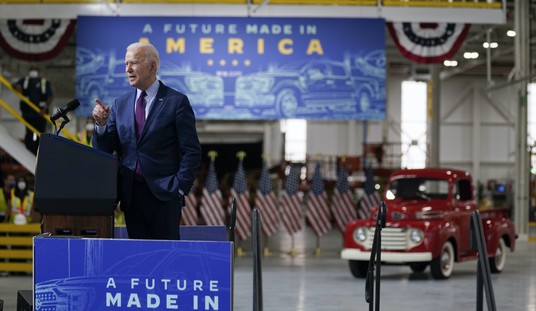Conservatives are having fun with this Greg Sargent post arguing that the legislative history of ObamaCare proves the Halbig case was wrongly decided. There were two versions of the exchanges drafted by congressional Dems in 2009, says Sargent. The first, the HELP Committee bill, was the Democratic dream scenario: It called for state exchanges and a federal exchange for those states that refused to build their own exchange and subsidies for consumers in both exchanges. The staff memo quoted by Sargent is pretty explicit about it. Any exchange, including the federal one, gets subsidies. That’s exactly the system we ended up with, Democrats now maintain — with one wrinkle:
Now, to be fair, the memo notes that the HELP Committee bill’s structure did delay subsidies to those in states that hadn’t yet set up their exchanges.
So even in the HELP bill, which gave Dems basically everything they wanted, there was some impulse to punish states that refused to build their exchange by withholding subsidies from their residents temporarily. Back to that in a minute.
The second bill was the Senate Finance Committee bill. In that one, there was no federal exchange. There were only state exchanges, with the feds empowered to build an exchange for any state that refused to build one but required to appoint some nonprofit entity to actually run the darned thing afterward. Here too, subsidies were available to consumers on both types of exchange. But the Finance Committee clearly wanted a smaller role for the feds than a full federal exchange, just as HELP wanted a smaller role for the feds by giving states a (temporary) incentive via subsidies to create their own exchanges.
Eventually these two bills were merged — and, if you believe Sargent, the resulting bill somehow gave the feds more power even though each of the underlying bills sought to limit federal power in different ways. Essentially, and very conveniently, he’s arguing that we ended up with a version of the HELP bill except without that little wrinkle about withholding subsidies from states that delayed building their own exchanges. Subsidies for everyone, right from the start! You could just as easily argue, though, that the fact that the final ObamaCare bill isn’t as explicit as HELP in extending subsidies to the federal exchange means — ta da — that Congress didn’t intend to extend those subsidies. When language from an earlier version of a bill disappears from a later version, courts tend to assume, understandably, that it disappeared for a reason:
Here's the Supreme Court in 1987 http://t.co/O2xMiQeJGl pic.twitter.com/2wIzwSh4VI
— Dan McLaughlin (@baseballcrank) July 29, 2014
As Leon Wolf puts it:
Even for people who take legislative history as a thing that ought to be given great weight, the fact that Congress included a clause in an earlier version of the bill but then changed or removed it in the final version is considered to be conclusive evidence that Congress specifically desired the change in question, not that they intended the earlier version. Let’s say hypothetically that you had a bill that said when it came out of committee, “Congress hereby appropriates $10 million for the funding of studies the mating habits of pink salmon and $5 million for the funding of studies of the mating of silver salmon,” but the final version of the bill merely said “$1o million for the funding of studies of the mating habits of pink salmon,” courts (like reasonable people) come to the inescapable conclusion that the clause about the silver salmon was removed per the deliberate intent of Congress otherwise it would have remained in the bill.
If Congress wanted the HELP bill, why didn’t it just enact the HELP bill? By watering down the language and merging it with the Finance Committee bill, which dropped the idea of a federal exchange entirely, it pointed to a more state-centric structure for ObamaCare. And if they wanted the states to have a bigger role, go figure that they might have ramped up the incentive to have states build their own exchanges by tweaking that little wrinkle in HELP so that consumers in state exchanges were the only ones eligible for subsidies permanently.
Read all of Sargent’s post, as he has quotes from a few Senate staffers at the time insisting that they wanted everyone to have subsidies. I guess, in the battle of experts, our side will just have to make do with Jon Gruber.








Join the conversation as a VIP Member